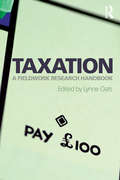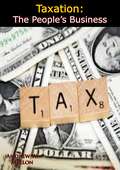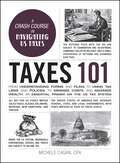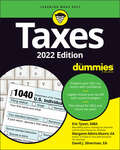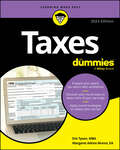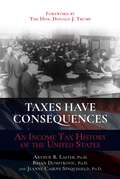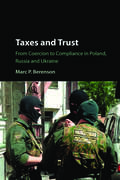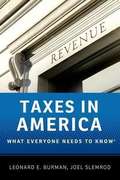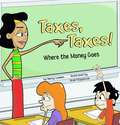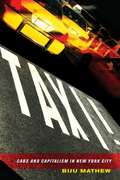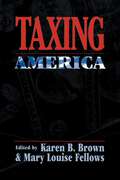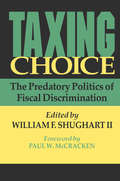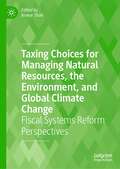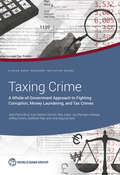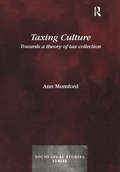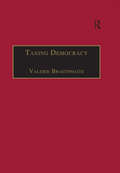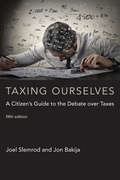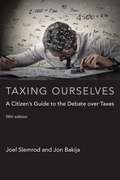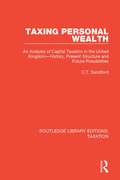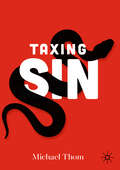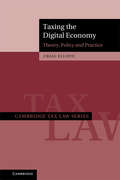- Table View
- List View
Taxation, Responsiveness and Accountability in Sub-Saharan Africa
by Wilson PrichardIt is increasingly argued that bargaining between citizens and governments over tax collection can provide a foundation for the development of responsive and accountable governance in developing countries. However, while intuitively attractive, surprisingly little research has captured the reality and complexity of this relationship in practice. This book provides the most complete treatment of the connections between taxation and accountability in developing countries, providing both new evidence and an invaluable starting point for future research. Drawing on cross-country econometric evidence and detailed case studies from Ghana, Kenya and Ethiopia, Wilson Prichard shows that reliance on taxation has, in fact, increased responsiveness and accountability by expanding the political power wielded by taxpayers. Critically, however, processes of tax bargaining have been highly varied, frequently long term and contextually contingent. Capturing this diversity provides novel insight into politics in developing countries and how tax reform can be designed to encourage broader governance gains.
Taxation: A Fieldwork Research Handbook
by Lynne OatsTaxation is a subject of enquiry that cuts across a range of disciplines, including law, economics, politics, psychology, history and accountancy, to name a few. However, research into taxation as a social and institutional phenomenon – rather than as abstraction from the real world – is largely neglected. Taxation: A Fieldwork Research Handbook opens up new avenues of enquiry in the research of taxation by offering suggestions on how research might be conducted into actual tax practice, rather than abstract models. This book: Introduces tax as a field of enormous potential for research to all social scientists Explains the methodological issues relating to tax research Provides new opportunities for tax researchers to widen the scope of their enquiries Encourages researchers to think differently about this subject Given the importance of taxation to modern society, not only as a revenue raising mechanism, but also as a tool of governance used to influence social actors, this unique text is a vital read for any social science researcher interested in this subject.
Taxation: The People’s Business (Big Business)
by Andrew W. MellonOriginally published in 1924, this book contains various explanations and views on the American tax system by the reformer Andrew Mellon. During his 11 years in office as Secretary of the Treasury, he cut income taxes, reduced public spending, and brought an end to the excess profits tax--all while reducing the federal debt left over from World War I. Mellon's views on taxation expressed within this book have appeared in letters to Committee of Congress and various organizations and individuals, and are used throughout to illustrate his points, whilst also serving to publish them in a compact form, in one volume. The book also includes various tables and documents of scholarly interest.
Taxes 101: From Understanding Forms and Filing to Using Tax Laws and Policies to Minimize Costs and Maximize Wealth, an Essential Primer on the US Tax System (Adams 101 Series)
by Michele CaganLearn the ins and outs of paying taxes with this engaging, informative, and easy-to-navigate guide to the US tax system.If you want to understand your finances, you need to understand your taxes. Learn everything you need to know about the US tax system and become more financially independent with Taxes 101. As people become more motivated to be as financially literate as possible, understanding every part of their financial wellness is key. With Taxes 101, you will learn the basics of the US tax system, from the system structure and kinds of taxes to all the tax laws that lead to deductions and credits and the forms associated with filing. This all-in-one financial resource lays the foundation with basic information about the tax system so you can make better choices about your financial wellness.
Taxes For Dummies: 2022 Edition
by Eric Tyson David J. Silverman Margaret Atkins MunroTake the anxiety out of tax season and file your return with confidence In Taxes For Dummies, 2022 Edition, you'll get line-by-line advice and plan ahead strategies that take the fear and anxiety out of tax season and save you money now and in the months and years ahead. This completely updated edition includes detailed coverage of the numerous tax bills have passed in recent years. You'll learn everything you need to know to file your own taxes with confidence and intelligently plan year-round tax strategies. In this book, you'll: Discover how to take advantage of every deduction and tax credit that applies to your specific circumstances Learn to navigate the IRS website and the newest versions of the most popular online tax preparation and filing options Understand new retirement account options and the implications of new foreign taxation rules Plan ongoing, multi-year tax strategies that will help you achieve your financial goals at every stage of your life Taxes For Dummies, 2022 Edition is the perfect resource for any United States taxpayer planning to file their own 2021 taxes. Whether you're a first-time taxpayer, an expat filing from outside the US, or a seasoned veteran of tax season looking for the latest deductions and strategies to reduce your tax bill, this book is a must-read resource that'll transform how you think about taxes.
Taxes For Dummies: 2024 Edition
by Eric Tyson Margaret A. MunroCut your tax bill down to size with year-round tips and tricks Taxes For Dummies is the antidote to the annual headache that is the U.S. tax system. This book paves the way for you to file a return that maximizes all the deductions and credits available to you. It also provides insight on making smart financial decisions that help minimize your tax burden. Need to correct or revise a return? You’ll find all the information you need to do it right this time. And, of course the A-word is covered—learn what to do if the IRS shows up on your doorstep to audit your return. This new edition provides updates on the latest changes to the U.S. tax system, so you can sail through this year’s tax season, headache free. Prepare your yearly tax return with confidence Apply sound strategies to reduce your tax bill Discover year-round ways to keep more of your earnings Create a tax-savvy financial plan, with or without the help of an advisorWith Taxes For Dummies, anyone seeking a deeper understanding of the U.S. tax filing system can learn what they need to save money and manage taxes throughout the year.
Taxes Have Consequences: An Income Tax History of the United States
by Arthur B. Laffer Brian Domitrovic Jeanne Cairns SinquefieldThe definitive history of the effect of the income tax on the economy.Ever since 1913, when the United States first imposed the income tax via constitutional amendment, the top rate of that tax has determined the fate of the American economy. When the top rate has been high, as in the late 1910s, the 1930s, 1940s, 1950s, and 1970s, the response of those with money and capital has been to curtail real economic activity in favor of protecting assets and income streams. Huge declines have come to the economy in these circumstances. The most brutal example was the Great Depression itself. When the top tax rate has been cut and held at reduced levels—as in the 1920s, the 1960s, in the long boom of the 1980s and 1990s, and briefly in the late 2010s—astonishing reversals have occurred. The rich have brought their money out of hiding and put it to work in the economy. The huge swings in the American economy since 1913 have had an inverse relationship to income tax rates.
Taxes and Trust: From Coercion To Compliance In Poland, Russia And Ukraine
by Marc P. BerensonTaxes and Trust is the first book on taxes to focus on trust and the first work of social science to concentrate on how tax policy actually gets implemented on the ground in Poland, Russia and Ukraine. It highlights the nuances of the transitional Ukraine case and explains precisely how and why that 'borderland' country differs from the more ideal-types of coercive Russia and compliance-oriented Poland. Through nine bespoke taxpayer surveys, an unprecedented bureaucratic survey and more than fifteen years of qualitative research, the book emphasizes the building and accumulation of trust to transition from a coercive tax state to a compliant one. The context of the book will appeal to students and scholars of taxation worldwide and to those who study Russia and Eastern Europe.
Taxes in America: What Everyone Needs to Know
by Leonard E. Burman Joel SlemrodThe book focuses on U.S. tax policy and offers an overview of state and local taxation in the United States, with main focus on federal taxes.
Taxes, Taxes! Where the Money Goes
by Nancy LoewenProvides an introduction to taxes, and discusses some of the products and services that citizens may receive including schools, roads, and national defense.
Taxes: Important Details You Should Know
by Harvard Business School PressAlthough companies often assign their tax issues to specialists, leaving managers off the hook, it pays for those managers to understand some basic tax concepts, especially those that creep into most financial decisions. This chapter defines the basics, such as the differences between various legal forms of business and the tax implications of each; progressive tax rates vs. marginal tax rates; and the differences between tax deductions and and tax credits.
Taxi! Cabs and Capitalism in New York City
by Biju MathewIn recent years, however, the working conditions and the nature of cab ownership have changed. As Biju Mathew reveals in this lively account of the benefits and hardships in the lives of today's taxi drivers, just about everything has changed dramatically except the yellow paint. At once a passionate declaration of worker solidarity and an ethnography of work, Taxi is a compelling narrative of the lives of immigrant taxi drivers in New York City. This updated edition covers the formation of the International Taxi Workers Alliance, the unusual collaboration with the Central Labor Council, and 2007 taxi strikes protesting New York City's plan requiring taxicabs to install costly global positioning systems and credit-card machines.
Taxi, Limousine, and Transport Network Company Regulation: Recurring Challenges
by John Scott James M. Cooper Jorgen AarhaugThe vehicle for hire (VFH) market – broadly comprising taxis, limousines, and app-based transport – has faced multiple and significant changes over the years, with the period since 2010 a time of major upheaval. This book documents the development of the market over time, examining its regulation and control structures, exploring its history, trends, and market theories, and discussing how these are both promoted and challenged by the changes affecting the sector. This book reviews recent developments in the VFH industry, from the influx of new market entrants and the emergence of app-based services to their widespread use, comparing international markets and their regulation, and draws on a series of case studies in key locations in North America, Europe, and Asia. It establishes and details economic, market, social, and political theory affecting the VFH industry and devotes its second half to the definition and emergence of transport typologies and markets in which the sector has a role (or potential role). The book concludes, from a neutral standpoint, on the balance between market participants, addressing the immediate future facing the industry, including the impacts of Covid and other external factors. It considers the short- and long-term effects of market change, the role played by regulators, and the market conditions imposed upon them. Written for industry practitioners – both suppliers and regulators – as well as the academic community, this book will inform the community and prompt further analysis of a significant and growing field in transportation.
Taxing America (Critical America #44)
by Karen B. Brown and Mary Louise FellowsIn the winter of 1996, Steve Forbes--publisher, heir, and presidential candidate--captured the American imagination with his proposal for a flat tax. But while Mr. Forbes claimed that such a tax would level the economic playing field by eliminating countless loopholes and miles of red tape, his actual proposal betrayed such claims to fairness by overtaxing workers and undertaxing financial capital. In the face of recent proposals for dramatic and far-reaching tax reform, Taxing America takes a critical look at the way the federal government collects its revenue and exposes the bias at the heart of a system which claims to be objective and fair. Contrary to traditional tax scholarship, these writers argue that an awareness of disability discrimination, economic exploitation, heterosexism, sexism and racism is crucial to any analysis of tax policy. Gathering together essays whose topics range from federal housing policy to environmental clean-up costs to tax treaty policy making, Karen B. Brown and Mary Louise Fellows present a philosophy that is as simple as it is radical: economic arrangements contribute significantly to the creation of social hierarchies and the perpetuation of discrimination. Given this reality, Brown and Fellows maintain that the goal of the federal tax law should be social justice and the disruption of discriminatory and exploitative practices.
Taxing Choice: The Predatory Politics of Fiscal Discrimination
by William Shughart IITaxing behavior deemed "politically incorrect" has long been a convenient way for politicians to fund programs benefiting special interest groups, to the public's disadvantage. Government policy toward various goods - drugs, tobacco and alcohol, for example - has been locked into a regulatory cycle of tax and taboo. Support for legalizing other substances is buttressed by the revenue-generating power of so-called "sin" taxesi And the products subjected to excise taxation have varied from soft drinks, fishing gear and margarine to airline tickets, telephone calls and gasoline. Taxing Choice thoroughly addresses the costs and benefits of these predatory public policies.Shughart notes that the record of such punitive selective taxation has been anything but successful, hindering economic progress and failing to deliver the promised social benefits. In addition, the costs of selective taxes fall disproportionately on lower-income people, while more politically powerful interest groups benefit. At the same time, such policies are a poor way to raise funding for public services, and foster political corruption and self-serving bureaucracies accountable to no one. Indeed, policies discriminating against certain products may represent ominous trends easily extended into virtually every facet of people's lives. One can envision policies proscribing foods, sun bathing, obesity, and even books, films, and political and religious beliefs deemed "dangerous."Part I is devoted to the political economy of selective taxation. Contributors trace the history and politics of selective excise taxes in the United States, discussing the range of products that have been subject to such taxation from the founding period to the present. Part II explains how these taxes emerge in a political marketplace with opposing pressure groups scrambling for wealth transfers in their own favor. Part III looks at taxes on specific products as well as such banning policies as Prohibition and the war on drugs. Constitutional, economic, and civil liberty issues, including civil asset forfeiture and product liability, are discussed in Part IV. With the accelerating national debate over tax reform and the downsizing of government, Taxing Choice is a timely and far-reaching contribution to a debate of great interest to economists, policymakers, historians, sociologists, and taxpayers in general.
Taxing Choices for Managing Natural Resources, the Environment, and Global Climate Change: Fiscal Systems Reform Perspectives
by Anwar ShahThis book reviews taxing choices to protect the local and global environment and preserve and sustain natural resources. Alternative economic instruments such as carbon taxes and tradable permits to combat global climate change are also examined. Strategies and practices for the managing and sharing of revenues from natural resources are highlighted. Also, roles of various orders of government in managing, taxing, and sharing natural resources in selected countries are documented to highlight the impact of such division of responsibilities in preserving natural resources and the environment. The susceptibility of resource revenue dependent economies to corruption and malfeasance, and the Dutch disease, is also highlighted. This book could serve as a supplementary reference book for graduate and undergraduate courses and as a sourcebook for journalists, researchers, policymakers, and government practitioners.
Taxing Crime: A Whole-of-Government Approach to Fighting Corruption, Money Laundering, and Tax Crimes (StAR Initiative)
by Jean-Pierre Brun Rita Julien Ana Gomez Ndubai Yara Soto Siddhesh RaoTaxing Crime: A Whole-of-Government Approach to Fighting Corruption, Money Laundering, and Tax Crimes examines how tax audits and investigations can lead to uncovering white-collar crime and how investigations of corruption can, in turn, lead to prosecutions of tax evasion or recovery of unpaid taxes. Prepared jointly by the World Bank and the United Nations Office on Drugs and Crime (UNODC) Stolen Asset Recovery Initiative (StAR) and the Global Tax Policy Center at the Institute for Austrian and International Tax Law, Vienna University of Economics and Business, this report offers analysis, case studies, examples of legal and operational frameworks, and recommendations that policy makers can use to enhance cooperation between tax authorities and law enforcement agencies at the national and international levels. This study is designed to serve as a reference and source of advocacy for policy makers, but it may be useful to other practitioners as well, including law enforcement offi cials, investigating magistrates, and prosecutors. Specifically, chapters present strategic considerations for establishing communication channels between tax and criminal investigative agencies; suggestions for combining tax and financial crime prosecution as part of an interagency asset recovery strategy; and approaches to developing interagency information exchange at the regional and international levels. It concludes with recommendations on ways to enhance the roles of both the tax authorities in combating money laundering and corruption and of the law enforcement authorities in recovering the proceeds of tax crimes. • Chapter 1 provides an introduction. • Chapter 2 presents strategic considerations for establishing information exchange channels between tax and criminal investigative agencies. • Chapter 3 explains how to combine tax and financial crime prosecution as part of an interagency asset recovery strategy. • Chapter 4 discusses approaches to developing interagency information exchange at the regional and international levels. • Chapter 5 provides recommendations for future efforts to enhance the role of tax authorities in supporting efforts to combat money laundering and corruption, and the role of law enforcement authorities in the recovery of proceeds of tax crimes. • The appendix contains case studies that illustrate effective interagency cooperation, including at the international level.
Taxing Culture: Towards a Theory of Tax Collection Law (Socio-Legal Studies #14)
by Ann MumfordThe introduction of self-assessment for income tax collection in the late 1990s marked a striking moment of cultural convergence between the UK and the US. This book analyses the socio-political factors leading to and resulting from this fundamental change in the relationship between taxpayers and the Inland Revenue, using perspectives in comparative law and the new outlooks of modern tax and cultural theory. It will be of interest to those studying theories of compliance, cultural legal studies, and law and society.
Taxing Democracy: Understanding Tax Avoidance and Evasion
by Valerie BraithwaiteThe integrity of tax systems as we know them are being challenged throughout the world. Tax avoidance schemes of various kinds are proving increasingly attractive and lucrative to wealthy individuals and large corporations. As governments fear the erosion of their tax base among those who are most able to contribute, the public is looking on, as one of its most public institutions attempts to re-invent itself through changing laws and administrative procedures. In this book, a number of experts develop the idea of responsive regulation in relation to taxation. They demonstrate how law in this area is undermining social norms and social norms are undermining law. A key factor in their analysis is the perception of justice. Explanations as to why the integrity of tax systems is under siege, and possible solutions, are examined.
Taxing Ourselves, fifth edition: A Citizen's Guide to the Debate over Taxes (The\mit Press Ser.)
by Joel Slemrod Jon BakijaThe new edition of a popular guide to the key issues in tax reform, presented in a clear, nontechnical, and unbiased way.To follow the debate over tax reform, the interested citizen is often forced to choose between misleading sound bites and academic treatises. Taxing Ourselves bridges the gap between the oversimplified and the arcane, presenting the key issues clearly and without a political agenda. Tax policy experts Joel Slemrod and Jon Bakija lay out in accessible language what is known and not known about how taxes affect the economy and offer guidelines for evaluating tax systems—both the current tax system and proposals to reform it. This fifth edition has been extensively revised to incorporate the latest data, empirical evidence, and tax law. It offers new material on recent tax reform proposals, expanded coverage of international tax issues, and the latest enforcement initiatives. Offering historical perspectives, outlining the basic criteria by which tax policy should be judged (fairness, economic impact, enforceability), examining proposals for both radical change (replacement of the income tax with a flat tax or consumption tax) and incremental changes to the current system, and concluding with a voter's guide, the book provides readers with enough background to make informed judgments about how we should tax ourselves.Praise for earlier editions“An excellent book.”—Jeff Medrick, New York Times“A fair-minded exposition of a politically loaded subject.”—Kirkus Reviews
Taxing Ourselves: A Citizen's Guide to the Debate over Taxes
by Joel Slemrod Jon BakijaTaxing Ourselves bridges the gap between the oversimplified and the arcane, presenting the key issues clearly and without a political agenda. Tax policy experts Joel Slemrod and Jon Bakija lay out in accessible language what is known and not known about how taxes affect the economy and offer guidelines for evaluating tax systems―both the current tax system and proposals to reform it.
Taxing Personal Wealth: An Analysis of Capital Taxation in the United Kingdom—History, Present Structure and Future Possibilities (Routledge Library Editions: Taxation #10)
by C.T. SandfordThis book, first published in 1971, presents an analysis of the taxes levied on wealth or capital – death duties, annual wealth taxes and capital gains taxes. It provides a comprehensive study of these taxes, and recommends a series of measures, including the replacement of certain taxes, that would promote equality. The book also provides a masterly historical summary of death duties in the UK.
Taxing Sin
by Michael ThomConventional wisdom dictates that those goods which are said to cause harm or impose costs on society deserve a special tax. For centuries, governments have levied these "sin taxes" on alcohol and tobacco, but the list of taxable sins has now grown to include soda and marijuana, with calls to impose further taxes on plastic bags, meat, and even robots and carbon. Contrary to what experts and policymakers tell us, many of these alleged sins impose very little, if any, cost on society, and the harms that do exist can be minimized without resorting to tax. What follows in this book is a discussion of four case studies—on tobacco, marijuana, alcohol and soda—which make the case against the conventional wisdom in taxing these "sins", before concluding that when it comes to taxing sin, it is time for governments to forgive—and forget.
Taxing Situations: Two Cases on Income Taxes and Financial Reporting
by William J. Bruns Jr. Susan S. HarmelingTwo whimsical situations are described to provide illustrations of situations where income taxes paid differ from the income tax expense that might be included in financial reports. In addition to illustrating that financial reported income may differ from taxable income, the case contains data, to allow students to discover the reasons for and nature of a deferred tax account.
Taxing the Digital Economy: Theory, Policy and Practice (Cambridge Tax Law Series)
by Craig ElliffeThe question of how to tax multinational companies that operate highly digitalised business models is one of the most contested areas of international taxation. The tax paid in the jurisdictions in which these companies operate has not kept pace with their immense growth and the OECD has proposed a new international tax compromise that will allocate taxing rights to market jurisdictions and remove the need to have a physical presence in the taxing jurisdictions in order to sustain taxability. In this work, Craig Elliffe explains the problems with the existing international tax system and its inability to respond to challenges posed by digitalised companies. In addition to looking at how the new international tax rules will work, Elliffe assesses their likely effectiveness and highlights features that are likely to endure in the next waves of international tax reform.

